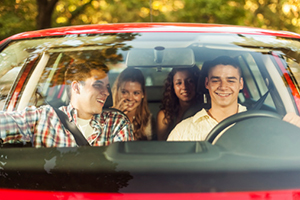100 deadliest days of driving occur in the summer.
 Many people like to relax during the summer. Unfortunately, it seems drivers also tend to relax their vigilance behind the wheel during summer. The period from Memorial Day to Labor Day typically brings a spike in the number of deadly car accidents across the country.
Many people like to relax during the summer. Unfortunately, it seems drivers also tend to relax their vigilance behind the wheel during summer. The period from Memorial Day to Labor Day typically brings a spike in the number of deadly car accidents across the country.
According to data from the Insurance Institute for Highway Safety, teen drivers may be at especially high risk of having an accident during the summer months. In 2013, the roughly 100 days of summer between June 1 and August 31 saw higher rates of teen car crash deaths than the rest of the year. Teen traffic fatality rates are typically highest on Friday, Saturday, and Sunday, and when you consider that summer is essentially one long weekend for teens the high summer accident rates make a lot of sense.
What Are the Risk Factors for Teen Drivers?
Simple inexperience is a major risk factor for new drivers. In the US the fatal crash rate per mile driven is nearly 3 times higher for teens than for adults age 20 and over. Add distractions and alcohol impairment to this inexperience, and you have a recipe for serious risks.
Distractions: One of the most dangerous distractions for teen drivers is other teenagers. Data shows that the risk of a fatal accident doubles when carrying 2 passengers under 21 and quadruples with 3 or more young passengers.
Alcohol Impairment: Teenagers are actually the age group least likely to drink and drive, but when they do imbibe, they are at a much higher risk of having an accident. This is especially true at low BAC levels.
What Teen Drivers Need to Know About Car Accidents
Being in a car accident is stressful for anyone, especially a new driver. However, the experience can feel much less overwhelming if drivers know how to react. Before you let your teenager loose on the roads this summer, make sure they know what to do in the event of a car accident large or small:
- Do not leave the scene. It is important to understand that leaving the scene of an accident—however minor—is considered a hit and run and can bring criminal penalties.
- Get medical care. If the car accident has resulted in an injury, the first priority is to ensure that injured individuals get needed medical care.
- Exchange information: All parties involved in the accident need to exchange identification, insurance information, and contact info. It is also a good idea to get contact information for any eyewitnesses to the accident.
- Document the scene: Take photos or video of the scene of the accident, including damage to vehicles and injuries, before the vehicles are moved.
- Do not admit fault. Make sure your teen knows that they should not admit fault for the accident to anyone as this could compromise their right to compensation later on if the accident was not entirely their fault.
- Call a parent. Teens should contact a parent immediately following an accident so that the adult can contact a car accident injury attorney for help as needed.




